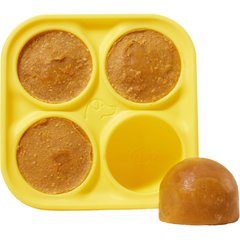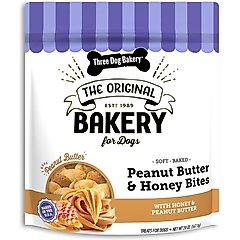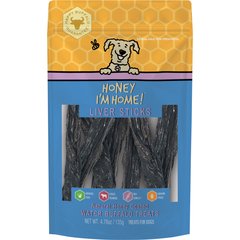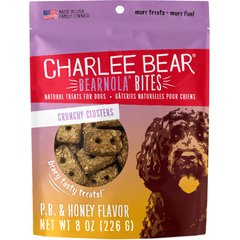Can Dogs Have Honey?
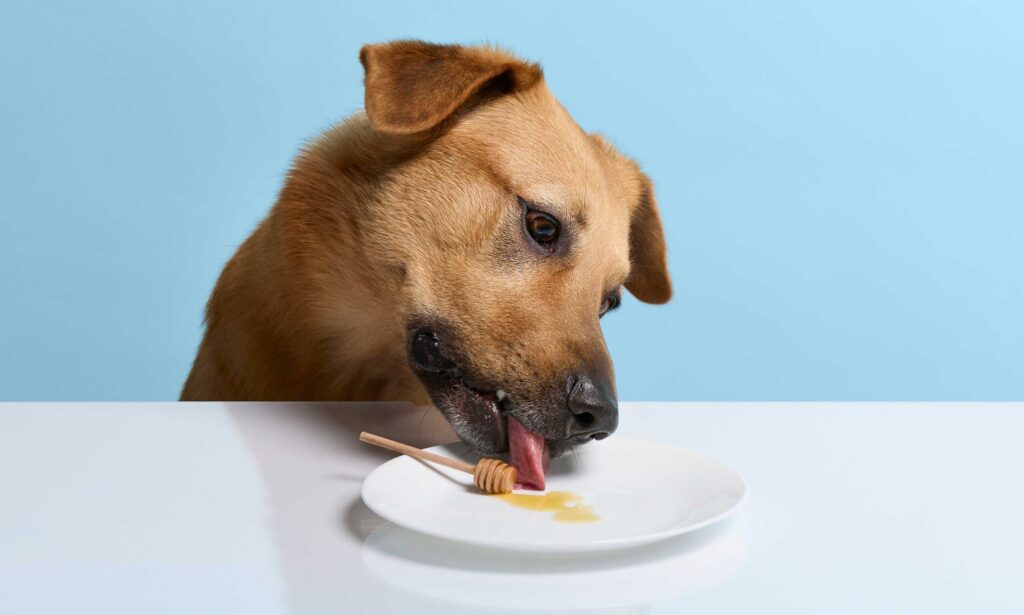
Photo by Chewy Studios
Honey is often touted as a natural remedy for allergies and coughs in humans, but can dogs have honey too? And does it provide the same benefits to dogs as it does to people?
While its health benefits are still being studied, honey is non-toxic to dogs and safe in small quantities. Here’s the scoop (or perhaps spoonful) on dogs and honey, including its potential benefits, risks, and guidelines for safely offering this golden nectar to your pup.
Before introducing any new food into your dog’s diet, always check with your veterinarian.
Key Takeaways
- Honey is generally safe for healthy adult dogs when given in small amounts, but it can cause an upset stomach, weight gain, or even allergic reactions (though this is rare).
- Raw honey may benefit adult dogs but shouldn’t be given to puppies or dogs with weak immune systems.
- Potential benefits of honey for dogs include antioxidants, anti-inflammatory support, and even soothing a cough.
- Always talk to your veterinarian before giving your dog honey.
Can Dogs Eat Honey?
Yes, they can! That said, it’s important to be aware of the different types and their unique benefits and risks.
Raw Honey
Raw honey is unpasteurized and typically considered the best option for most dogs, as it retains all the beneficial nutrients and medicinal properties.
However, raw honey should not be given to puppies or dogs with a compromised immune system, as it can contain bacteria that they may not be able to fight off.
Pasteurized Honey
The pasteurization process increases honey’s shelf life and eliminates any potentially harmful microorganisms. However, this heat treatment is believed to diminish the honey’s beneficial compounds.
Pasteurized honey is safe for dogs to have in small amounts, but it doesn’t come with the same potential benefits as raw honey.
Is Honey Good for Dogs?
So, your pup can eat honey, but is honey safe for dogs? It’s not only safe, but honey also offers some intriguing health benefits when given in appropriate amounts. Here are some of them:
- Nutritional boost: Raw, unpasteurized honey is rich in antioxidants, B vitamins, vitamin C, and several minerals, including calcium, magnesium, potassium, manganese, and zinc.
- Anti-inflammatory effects: Raw honey possesses anti-inflammatory properties that may aid in soothing minor injuries or joint pain.
- Cough support: The antimicrobial and anti-inflammatory effects of honey make it a good home remedy for mild cases of kennel cough. The honey may help soothe your dog’s sore throat, kill harmful bacteria, and reduce coughing.
- Wound care: Honey, especially a specific type called Manuka honey that is renowned for its heightened antibacterial properties, has been used for generations to promote healing of minor cuts, scratches, bites, hot spots, pressure sores, and burns.
Do not try honey as a home remedy for coughs or wounds without first consulting with your vet.
Is Honey Bad for Dogs?
While honey has a variety of potential health benefits for dogs, it’s important to be aware of the associated risks. Here are some things to consider:
- Weight gain: Honey is calorically dense and can contribute to weight gain if given frequently. Weight gain isn’t just uncomfortable for your dog, it can also increase the risk of health problems. Pet parents should not feed honey of any kind to sedentary, obese, or diabetic dogs.
- Botulism: Raw honey can contain botulism spores, a type of bacteria that can cause a rare but serious illness called botulism, which attacks your dog’s nervous system. Botulism spores are generally harmless to healthy adult dogs but could pose a risk to puppies who don’t have a fully developed immune system. Don’t feed honey to dogs under 12 months of age or those with compromised immune systems.
- Allergic reaction: Though rare, some dogs may have an allergic reaction to the pollen or other natural substances found in honey. Signs of an allergic reaction can include itching, swelling, difficulty breathing, or gastrointestinal issues. If you notice symptoms of an allergic reaction, consult your veterinarian immediately.
How Much Honey Can My Dog Eat?
Treats of all sorts, including honey, should make up no more than 10% of your dog’s daily calories. The other 90% should come from a complete and balanced diet.
A teaspoon of honey contains about 20 calories and 6 grams of sugar. The amount of honey that’s safe for your dog will vary based on their size.
Here are general recommendations for healthy dogs:
| Dog Size | Serving Size | Frequency |
|---|---|---|
| Extra-small dogs (2–10 pounds) | 1/4 teaspoon | 2–3 times per week |
| Small dogs (11–20 pounds) | 1/2 teaspoon | 2–3 times per week |
| Medium dogs (21–50 pounds) | 1 teaspoon | 2–3 times per week |
| Large dogs (51–90 pounds) | 1 1/2 teaspoons | 2–3 times per week |
| Extra-large dogs (91+ pounds) | 2 teaspoons | 2–3 times per week |
How To Safely Feed Honey to Dogs
If you’ve consulted with your veterinarian and decided that honey is OK for your dog, here are some creative and simple ways to serve it:
- Give them a spoonful. If you want to keep it simple, measure the appropriate amount of raw honey on a spoon and let your dog lick it off. This method is especially useful for dogs experiencing a mild cough.
- Drizzle it over their food. Add a little culinary excitement to your dog’s regular meal by drizzling a small amount of raw honey over their dog food.
- Make frozen honey cubes. For a refreshing summer treat, make frozen honey ice cubes. Mix 1 tablespoon of honey with 1 cup of water and freeze the mixture in an ice cube tray or mold tray. To minimize the risk of choking and dental damage, crush the ice cubes up into smaller pieces to serve.
Recommended Product
Homemade Dog Treats With Honey
You can also show love for your pup by whipping up some homemade dog treats that incorporate honey as one of the ingredients.
Here are some of our favorites:
Store-Bought Dogs Treats With Honey
If you prefer not to make homemade dog treats, you can also buy treats that include honey as an ingredient. Some options include:
Recommended Products
My Dog Ate Too Much Honey—What Do I Do?
In the short-term, eating too much honey can upset your dog’s stomach causing vomiting and diarrhea. But the long-term effects are more concerning.
Over time, too much honey can contribute to obesity and related health problems, including:
- Arthritis
- Difficulty breathing
- Heart disease
- Pancreatitis
- Diabetes
- Some types of cancer
To reduce risk, stick to recommended serving sizes and contact your veterinarian if your dog eats a large amount of honey.
Diabetic dogs should not be given honey, because its high sugar content can lead to hyperglycemia.
FAQs About Honey for Dogs
Q: Can puppies have honey?
A: Puppies under 12 months of age shouldn’t have honey. Honey can contain botulism spores that may cause serious illness in puppies without a fully developed immune system.
Q: Is honey toxic for dogs?
A: No, honey is not toxic dogs. Feeding a healthy dog a small amount of honey a couple times a week is considered safe.
Q: Can dogs have honey for allergies?
A: There’s not enough scientific evidence to say if honey can help improve a dog’s allergies but feeding them a small amount likely won’t make allergies worse.
Q: Is Manuka honey good for dogs?
A: Yes, Manuka honey is a good option for dogs. Manuka honey may promote gut health and support wound care when applied to your dog’s skin.
Attributions
This content was medically reviewed by a veterinarian.
